人教版高一英语定语从句全面讲解与练习
定语从句的详细讲解与练习 新课标 人教版-新人教版高一全册英语试题

定语从句讲解和练习定语从句是由关系代词和关系副词引导的从句,其作用是作定语修饰主句的某个成分,定语从句分为限定性和非限定性从句两种。
状语从句分为时间状语从句,结果状语从句,让步状语从句,原因状语从句,条件状语从句以与行为方式状语从句。
名词从句包括主语从句,宾语从句,表语从句和同位语从句与there be句型。
一、限定性定语从句1. that即可代表事物也可代表人,which代表事物;它们在从句中作主语或宾语,that在从句中作宾语时常可省略关系词,which在从句中作宾语如此不能省略。
而且,如果which在从句中作“不与物动词+介词〞的介词的宾语,注意介词不要丢掉,而且介词总是放在关系代词which的前边,但有的如此放在它原来的位置2. which作宾语时,根据先行词与定语从句之间的语义关系,先行词与which之间的介词不能丢3. 代表物时多用which,但在带有如下词的句子中用that而不用which,这些词包括all, anything, much等,这时的that常被省略4. who和whom引导的从句用来修饰人,分别作从句中的主语和宾语,whom作宾语时,要注意它可以作动词的宾语也可以作介词的宾语5. where是关系副词,用来表示地点的定语从句6. when引导定语从句表示时间〔注〕值得一提的是,表示时间“time"一词的定语从句只用when 引导,有时不用任何关系代词,当然也不用that引导By the time you arrive in London, we will have stayed there for two weeks.I still remember the first time I met her.Each time he goes to business trip, he brings a lot of living necessities, such as towers, soap, toothbrush etc.7. whose是关系代词,修饰名词作定语,相当于所修饰成分的前置所有格8. 当从句的逻辑主语是some, any, no, somebody, anybody, nobody, something, anything, everything或nothing时,常用there is来引导二、非限定性定语从句:非限定性定语从句的作用是对所修饰的成分作进一步说明,通常和主句间用逗号隔开,将从句拿掉后其他局部仍可成立1. which引导的非限定性定语从句来说明前面整个句子的情况或主句的某一局部2. 在引导限定性定语从句时,that有时相当于in which, at which, for which或at whiche.g. Attitudes towards daydreaming are changing in much the same way that(in which) attitudes towards night dreaming have changed.人们对白日做梦的态度正在改变,这与人们对夜间做梦的看法的变化有非常相似之处。
高中英语必修一-定语从句讲解-练习

高中英语必修一-定语从句讲解-练习定语从句讲解及练习I.主语和谓语一致1、关系代词在定语从句中主语,其谓语动词与先行词保持一致。
例如:The boy who is standing at the door is my son.2、在one of the +复数名词+定语从句结构中,复数名词是先行词,关系代词在定语从句中作主语,其谓语动词用复数形式。
例如:This is one of the best books that have ever been written on the subject.3、在“the only one of the +复数名词+定语从句”结构中,one 是先行词,关系代词在定语从句中作主语,其谓语动词用单数。
例如:This is the only one of the best books that has ever been written on the subject.II. 正确使用that 和which1、that 指物,有时也可以指人,which 指物,不能指人。
which 可以引导非限制性定语从句,也可以放在介词后面,that 则不能。
例如:Who is the man that is reading the newspaper?(正) Who is the man which is reading the newspaper?(误)The room in which she lives is a large one.(正)The room in that she lives is a large one.(误)2、先行词前面有形容词最高级,序数词next, last, very, any, little, no 等修饰时,用that 不用which 引导定语从句。
例如:This is the best film that I have seen.(正)This is the best film which I have seen.(误)3、先行词是all, much, little, none等时,用that而不用which 引导定语从句。
人教必修一Unit 4 定语从句之关系代词(解析版)
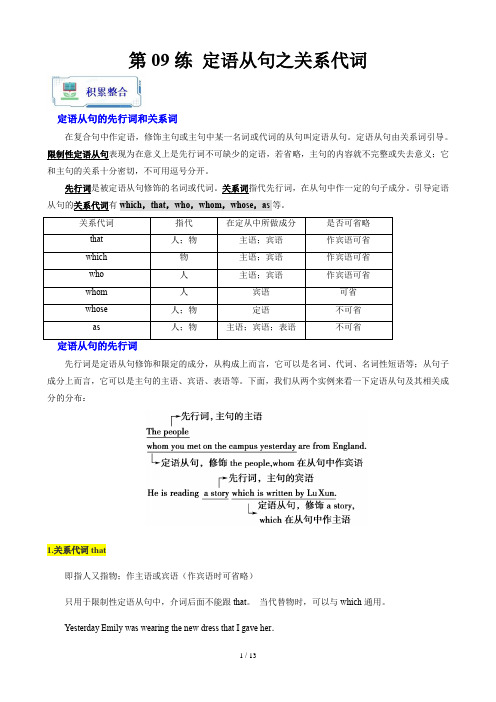
第09练定语从句之关系代词定语从句的先行词和关系词在复合句中作定语,修饰主句或主句中某一名词或代词的从句叫定语从句。
定语从句由关系词引导。
限制性定语从句表现为在意义上是先行词不可缺少的定语,若省略,主句的内容就不完整或失去意义;它和主句的关系十分密切,不可用逗号分开。
先行词是被定语从句修饰的名词或代词。
关系词指代先行词,在从句中作一定的句子成分。
引导定语从句的关系代词有which,that,who,whom,whose,as等。
先行词是定语从句修饰和限定的成分,从构成上而言,它可以是名词、代词、名词性短语等;从句子成分上而言,它可以是主句的主语、宾语、表语等。
下面,我们从两个实例来看一下定语从句及其相关成分的分布:1.关系代词that即指人又指物;作主语或宾语(作宾语时可省略)只用于限制性定语从句中,介词后面不能跟that。
当代替物时,可以与which通用。
Yesterday Emily was wearing the new dress that I gave her.昨天艾米丽穿了我送给她的新衣服。
I have a friend that likes listening to classical music我有个朋友喜欢听古典音乐。
2.关系代词which指物;作主语或宾语(作宾语时可省略)在非限定性定语从句中,只宜用which,不能用that.在限定性定语从句中,可用在介词之后。
My parents live in a house which is more than 100 years old我的父母住在一座具有100多年历史的房子里who,whom指人;作主语或宾语(whom常可省略)先行词必须为人。
Who可代替在从句中担任宾语的whom,若前有介词,须用whomA couch potato is a person who spends a lot of time watching TV.“A couch potato”指那种成天沉湎于电视中的人。
(完整)高中英语定语从句讲解及练习较全面.doc
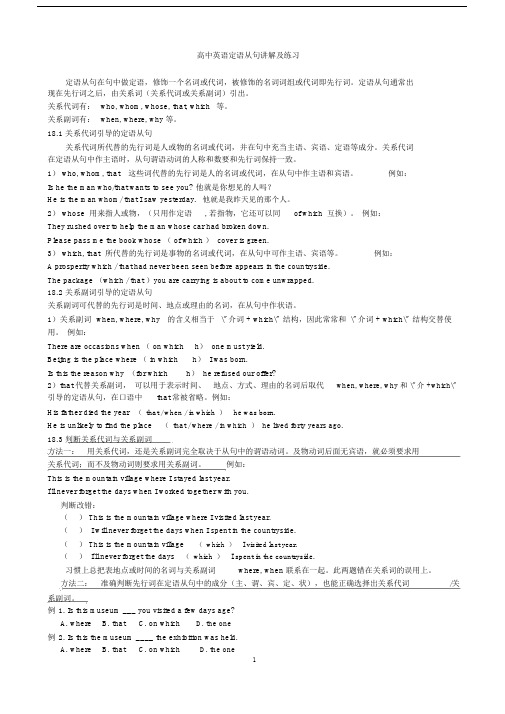
高中英语定语从句讲解及练习定语从句在句中做定语,修饰一个名词或代词,被修饰的名词词组或代词即先行词。
定语从句通常出现在先行词之后,由关系词(关系代词或关系副词)引出。
关系代词有:who, whom, whose, that, which等。
关系副词有:when, where, why 等。
18.1 关系代词引导的定语从句关系代词所代替的先行词是人或物的名词或代词,并在句中充当主语、宾语、定语等成分。
关系代词在定语从句中作主语时,从句谓语动词的人称和数要和先行词保持一致。
1) who, whom, that这些词代替的先行词是人的名词或代词,在从句中作主语和宾语。
例如:Is he the man who/that wants to see you? 他就是你想见的人吗?He is the man whom/ that I saw yesterday.他就是我昨天见的那个人。
2) whose 用来指人或物,(只用作定语, 若指物,它还可以同of which 互换)。
例如:They rushed over to help the man whose car had broken down.Please pass me the book whose ( of which ) cover is green.3) which, that所代替的先行词是事物的名词或代词,在从句中可作主语、宾语等。
例如:A prosperity which / that had never been seen before appears in the countryside.The package (which / that )you are carrying is about to come unwrapped.18.2 关系副词引导的定语从句关系副词可代替的先行词是时间、地点或理由的名词,在从句中作状语。
1)关系副词when, where, why的含义相当于\" 介词 + which\" 结构,因此常常和 \" 介词 + which\" 结构交替使用。
完整版)高中英语定语从句讲解及练习

完整版)高中英语定语从句讲解及练习定语从句是高中英语的重点知识,也是高考常考点。
本文将主要讲解关系代词引导的定语从句,并解释关系副词引导的定语从句,包括判断关系代词与关系副词限制性和非限制性定语从句等内容,并提供例题讲解。
定语从句在句中作定语,修饰一个名词或代词,被修饰的名词词组或代词即先行词。
通常出现在先行词之后,由关系词(关系代词或关系副词)引出。
关系代词有:who。
whom。
whose。
that。
which等。
它们代替的先行词是人或物的名词或代词,并在句中充当主语、宾语、定语等成分。
当关系代词在定语从句中作主语时,从句谓语动词的人称和数要和先行词保持一致。
例如,当先行词是人时,可以使用who或whom作为关系代词。
如:Is he the man who/that wants to see you?(他就是你想见的人吗?)关系代词在从句中作主语。
而当先行词是物时,可以使用which或that作为关系代词。
如:The package(which / that)you are carrying is about to come unwrapped.(你拿的包快散了。
)关系代词在从句中作宾语。
除了who。
whom。
whose。
that。
which,还有关系副词when。
where。
why等。
关系副词引导的定语从句也可以修饰一个名词或代词。
例如:I still remember the day when we met.(我仍然记得我们相遇的那一天。
)关系副词when在从句中作时间状语,修饰先行词day。
总之,掌握定语从句的用法和关系词的选择是英语研究的重要内容。
通过不断的练和实践,相信大家可以掌握这一技能。
关系副词可以代替时间、地点或理由的名词,在从句中作状语。
例如,关系副词when。
where。
why的含义相当于“介词+ which”结构,因此常常和“介词+ which”结构交替使用。
比如,有时候我们必须屈服,这是任何人都会遇到的情况(There are ns when [on which] one must yield)。
高一英语Unit4 语法 定语从句 讲解加练习 新课标 人教

(定语从句)
定语从句
定语从句在句子中起定语作用,修饰一个名词或代词,有时可修饰一个句子。被定语从句修饰的词叫作先行词,定语从句必须放在先行词的后面,由关系代词或关系副词引导。关系词充当从句的成分。
定语从句
限定性定语从句
非限定性定语从句
引导词
关系代词:
关系副词:
关系代词和关系副词 的作用
指代作用
连接句子的作用
That tall man is Tom’s father and he works in a shoe factory.
That tall man is Tom’s father, _____ works in a shoe factory.
who
5. as 和 which 都可以引导非限定性定语从句,指代主句一句话的内容,这时它们的区别是:
As we know , China is a developing country. As is known, China is a developing country. His dog died ,which made him unhappy.
that
宾语
(2)指物时,that与which可以互换,但要注意在特定情况下that与which的选用。
关系代词的用法: 1. that 和 which (1) that , which 都可以指物,——— 还可以指人,在从句中作主语或宾语, 作______ 时可以省略。
True or false All which you need to do is to press the button . I have read all the books that you gave me. 3. This is the best novel that I have read.
高一定语从句知识点的整理总结、专项训练题目
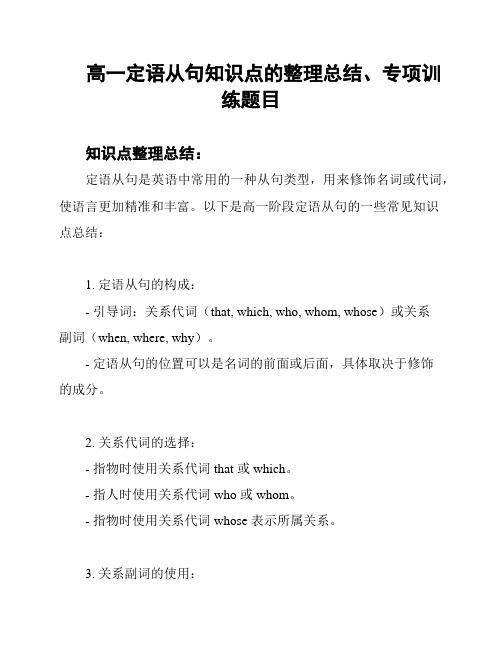
高一定语从句知识点的整理总结、专项训练题目知识点整理总结:定语从句是英语中常用的一种从句类型,用来修饰名词或代词,使语言更加精准和丰富。
以下是高一阶段定语从句的一些常见知识点总结:1. 定语从句的构成:- 引导词:关系代词(that, which, who, whom, whose)或关系副词(when, where, why)。
- 定语从句的位置可以是名词的前面或后面,具体取决于修饰的成分。
2. 关系代词的选择:- 指物时使用关系代词 that 或 which。
- 指人时使用关系代词 who 或 whom。
- 指物时使用关系代词 whose 表示所属关系。
3. 关系副词的使用:- where 表示地点。
- when 表示时间。
- why 表示原因。
4. 定语从句的省略:- 当关系代词在定语从句中作宾语且不作介词宾语时,可以省略。
5. 定语从句的限制性和非限制性:- 限制性定语从句对所修饰的名词起限定作用,不可省略。
- 非限制性定语从句对所修饰的名词作补充说明,用逗号隔开,一般可省略。
专项训练题目:1. 下列句子中有定语从句的是:- A. The book on the table is mine.- B. This is the pen that I lost yesterday.- D. The boy is tall.2. 选择正确的关系代词填空:- The house _______ you bought is very beautiful.- A. where- B. that- C. who3. 选择正确的关系副词填空:- Do you remember the day ______ we went to the beach? - A. when- B. who- C. why4. 下列句子中哪个是限制性定语从句:- A. My brother, who is a doctor, lives in Paris.- B. The dog that I adopted is very friendly.- C. The house, where we spent our vacation, is now on sale.5. 填入合适的关系代词或关系副词:- This is the bus _______ I often take to work.- A. who- B. when- C. that作答:1. B2. B3. A4. B5. C以上是高一定语从句知识点的整理总结和专项训练题目。
人教版高一英语定语从句全面讲解与练习
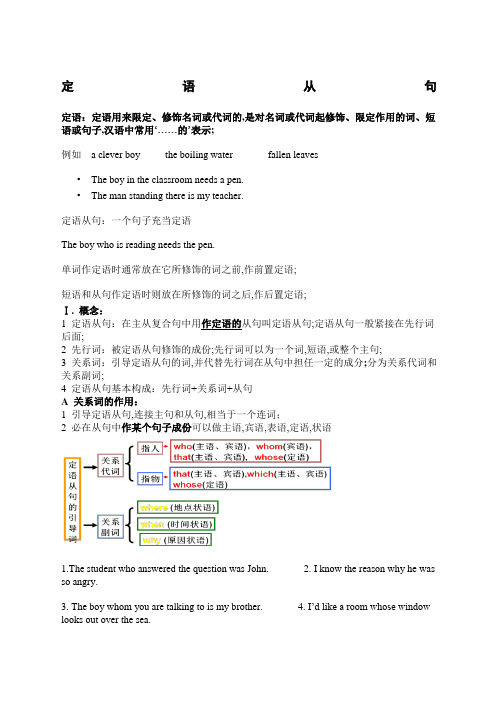
定语从句定语:定语用来限定、修饰名词或代词的,是对名词或代词起修饰、限定作用的词、短语或句子,汉语中常用‘……的’表示;例如 a clever boy the boiling water fallen leaves•The boy in the classroom needs a pen.•The man standing there is my teacher.定语从句:一个句子充当定语The boy who is reading needs the pen.单词作定语时通常放在它所修饰的词之前,作前置定语;短语和从句作定语时则放在所修饰的词之后,作后置定语;Ⅰ. 概念:1 定语从句:在主从复合句中用作定语的从句叫定语从句;定语从句一般紧接在先行词后面;2 先行词:被定语从句修饰的成份;先行词可以为一个词,短语,或整个主句;3 关系词:引导定语从句的词,并代替先行词在从句中担任一定的成分;分为关系代词和关系副词;4 定语从句基本构成:先行词+关系词+从句A 关系词的作用:1 引导定语从句,连接主句和从句,相当于一个连词;2 必在从句中作某个句子成份可以做主语,宾语,表语,定语,状语1.The student who answered the question was John.2. I know the reason why he was so angry.3. The boy whom you are talking to is my brother.4. I’d like a room whose window looks out over the sea.B简单句变定语从句例1:The girl is Mary. The girl is standing there.The girl who is standing there is Mary.如何改写定语从句1、找准主句和从句,并找出两个简单句的共有成分,确定先行词;2、将从句中的共有成分去掉;3.找准关系词,用关系词引导从句剩下的部分,并紧接在被修饰词先行词之后;例2:A plane is a machine. The machine can fly.例3:The girl is Mary. We saw her yesterday.C定语从句选择关系词三步曲:第一找出先行词;第二看先行词在定语从句中的语法功能做主语、宾语或状语;第三选择合适的关系词;Ⅱ. 几个关系代词的基本用法:●that: 可指人或物;在定语从句中作主语,宾语,表语;指人时,相当于who或whom;指物时,相当于which 一般不用于非限制性定语从句; 不可置于介词后作宾语如:1. A letter that/which is written in pencil is difficult to read. 主语2. Do you know the gentleman that/who spoke just now3. You can take anything that you like. 宾语4. What is the question that/which they are talking about5. Here is the man who/whom/that you want to see.●which: 指物;在定语从句中作主语,宾语如:1. The book which/that was on the desk was bought by my father.主语2. The book which/that I bought yesterday is very interesting.宾语3. He was proud, which his brother never was. 表语●who, whom, whose:who: 主格, 在从句中作主语,在口语或非正式用法中作宾语; 只可指人whom: 宾格,在从句中作宾语; 只可指人whose: 属格,在从句中作定语,可指人也可指物;I like the students who/that work hard. 主语All who heard the story were amazed. 代词如he, they, any, those, all, one等后多用who.He's a man from whom we should learn. 宾语= He's a man whom/who/that we should learn from.A child whose parents are dead is called an orphan.指人I'd like a room whose window faces south. 指物whose +n. =the +n. + of which 物= of which 物+ the +n.=I'd like a room of which the window faces south. whose + n. =the +n. + of whom人= of whom人+ the +n.=I'd like a room the window of which faces south.注意:定语从句中的谓语动词的单复数于先行词保持一致This is one of the best books that have ever been written.He is one of the students who study hard at school.当one前面有the only等限定词和修饰语时, 定语从句的谓语动词要与one保持一致而取单数形式例如This is the only one of the best books that has ever been written.He is the only one of the students who studies hard at school.Ⅲ. 几个易混淆的关系代词的比较:●宜用that, 而不宜用which 的情况.①先行词为不定代词表示物,all, much, something, everything, anything ,nothing, none, the one等,②先行词被only, any, few, little, no, just, very, one of等词修饰时;③先行词是序数词时或被序数词修饰时;④先行词是最高级或被最高级修饰时;.⑤先行词既有人又有物,用which和who都不适合,这时宜用that. 如:⑧主句是There be 结构,修饰其主句的定语从句宜用that 作关系代词. 如:1. There is still a seat in the corner that is still free.⑨被修饰成分为表语时,或者关系代词本身是定语从句的表语时,该关系代词宜用that .2. My home village is no longer the place that it used to be .●定语从句中宜用which而不宜用that 的情况:①当关系代词的前面有介词时.1.A zoo is a park in which many kinds of animals are kept for exhibition.②在非限制性定语从句中.1.Crusoe's dog, which was are now very old, became ill and died .2.More and more people are beginning to learn English, which is becoming very popular in our country. which 指代主句B who & that:● who 和that 指代人时,有些情况宜用who, 而不宜用that①先行词为anyone, anybody, those, all, one, ones, they, he, people时. 如:.②在There be 结构中,修饰主语的定语从句宜用关系代词who 指代人. 如:1.There is a gentleman who wants to see you .Ⅳ.关系副词引导的定语从句:●When 指时间,在定语从句中作时间状语;定语从句中when=in/on/at which, 其先行词是表时间的名词如:time, day, week, tear, month, etc.I still remember the day when /on which my brother joined the army.作状语I shall never forget the day when Shen Zhou Ⅴwas launched, which has a great effect on my life.I still remember the days which/that we spent together. 作宾语Next winter which/that you'll spend in Harbin, I'm sure, will be exciting.●Where 指地点,在定语从句中作地点状语;定语从句中where=in/on/at which,其先行词是表示地点的名词,如:place, school, factory, room, etc.This is the factory where /in which he worked last year. 作状语This is the place where I was born.This is the park which/that they visited last year. 作宾语I live in the room which was bought by my father.I think you have got to the point where a change is needed, or you would fail.He's got himself into a dangerous situation where he's likely to lose control of the plane.●Why 指原因,在定语从句中作原因状语;先行词为reason 时,可用for which指代;如:That’s the reason why/for which he was late.The reason why / for which he didn't attend the meeting was that he was ill.I don't believe the reason that/which he gave me. 作宾语Have you asked him the reason t hat may explain his success 作主语当先行词为way时,关系词在句中作状语时,定语从句常用that, in which引导,that常可以省略;way后的定语从句的引导词不用时较多;但如果关系词在句中作主语或宾语时,则用which或that 引导;如:This is the way that /in which I do such things.比较: Please do the experiment in the waythat/whichI have shown you.V.介词+关系代词考点1.基本考点考点1 简单介词+关系代词引导定语从句时,that和who不能用于介词之后,能用于介词+关系代词引导定语从句的代词只有which和whom;考查“介词+ 关系代词”引导的定语从句,关系代词前该选什么样的介词,要根据不同的语境、词组搭配、习语、惯用法等来决定,归纳起来介词的选择主要依据如下几点:①介词与定语从句的先行词搭配;如:The farm on which I once worked has taken on a new look.on the farm②介词与从句中动词搭配;如:Who is the man with whom our teacher is shaking hands shake hands with sb.In the dark street there wasn’t a single person to whom she could turn for help. turn to sb. for help③介词与定语从句中的形容词搭配,如:The west lake, for which Hang Zhou is famous, is a beautiful place. be famous for④根据句子的意思来决定, 此时不但要注意其前的搭配也要注意其后的搭配;Water is very important for us without which we can’t live.2004辽宁The factory produces half a million pairs of shoes every year, 80% of which are sold abroad.2006辽宁I was told that there were about 50 foreign students studying Chinese in the school, most of whom were from Germany.The old man has two daughters.Both of them are doctors.那位老人有两个女儿,她们都是医生;③as 常用在as we all know;as you know; as is known to all; as you see; as we can see; as has been expected 等结构中;例如:一般译为"正如""就像","这一点"As we all know, smoking is harmful to one's health . as 作宾语=As is known to all, smoking is harmful to one's health . as 作主语=It's known to all that smoking is harmful to one's health .=Smoking is harmful to one's health, as we all know .as 作宾语Jack has won the first prize, as often happens. 像往常一样,Jack得了一等奖;训练题汇总◆EX1用适当的关系词填空.1. I will never forget the day __________ I first went to school.I will never forget the day __________ we spent in Beijing.2. The house __________ we visited is being repaired now.The house ______ Luxun once lived is being repaired now.◆Ex2选择适当的代词填空,注意非限制性定语从句和单句的比较;1.I am reading Harry Porter, _____is an interesting book.2.He failed in the exam._______ made his parents angry.3.He failed in the exam, _______made his parents angry.4.He has two sons. Both of ________ are teachers.5.He has two sons, both of ________ are teachers.◆EX3 思考:用五种方式定语从句翻译句子这是他工作的工厂;1. This is the factory________ he works.2. This is the factory ________he works.3. This is the factory________ he works in.4. This is the factory ________he works in.5. This is the factory________he works in.◆EX4 思考: 介词+关系代词的情况介词+关系代词的情况 1The man whom you spoke________ was a scientist. The city ________she lives in is far away.介词+关系代词的情况2 改错The man to who you spoke was a scientist.The city in that she lives is far away.◆Ex5: 介词+关系代词的使用1. Do you like the book she spent $102. Do you like the book she paid $103. Do you like the book she learned a lot4. Do you like the book she often talks5. He dug a hole he could got water from the lake.6. There is a tall tree outside, stands our teacher.7. China has a lot of rivers, the second longest ___________is the Yellow River.8. The man ____________ I spoke on the phone last night is very good at swimming.9. He paid the boy $10 for washing ten windows, most __________ hadn’t been cleaned for at least a year.。
高中定语从句全面详细讲解附练习题加答案

高中定语从句详细讲解【摘要】定语从句是一种形容词的关系从句。
它由关系代词或关系副词引导(1)。
初中英语中的定语从句仅限于限制性定于从句,但对初中生来说,定语从句既是一个重点,也是一个难点。
【关键词】定语从句先行词关系代词关系副词一、英语中的定语从句与汉语中的定语位置不同。
在复合句中,修饰某一名词或代词的从句叫做定语从句。
英语中的定语从句始终要放在被修饰的词之后,而汉语中的定语则放在被修饰词之前。
如:The man who / that I saw at the school gate yesterday is my English t eacher.先行词定语从句昨天我在校门口看见的那个人是我的英语老师。
二、英语从句中的句型结构比较复杂,有先行词、关系代词或关系副词。
被定语从句修饰的词叫先行词,引导定语从句的关联词有关系代词或关系副词。
限制性关系分句和它的先行项的所指意义有着不可分割的联系(2)。
关系代词或关系副词放在先行词和定语从句之间起纽带作用,关系代词或关系副词在定语从句中要充当一个成分。
关系代词在句中可作主语、宾语或定语,关系副词在句中作状语。
如:I am waiting for the boy who /that is wearing a red coat. (主语)先行词关系代词我正在等穿着红色外套的那个男孩。
The dictionary that / which my sister gave me last Sunday is very ex pensive.(宾语)先行词关系代词我姐姐上周星期天给我的那本字典很贵。
The woman is his mother whose name is Linda Brown. (定语)先行词关系代词那个是他的母亲,名叫琳达·布朗。
That is the house where my father used to live.(状语)先行词关系副词那是我父亲曾经居住过的房子。
(word完整版)人教版高一英语定语从句全面讲解与练习(2021年整理)
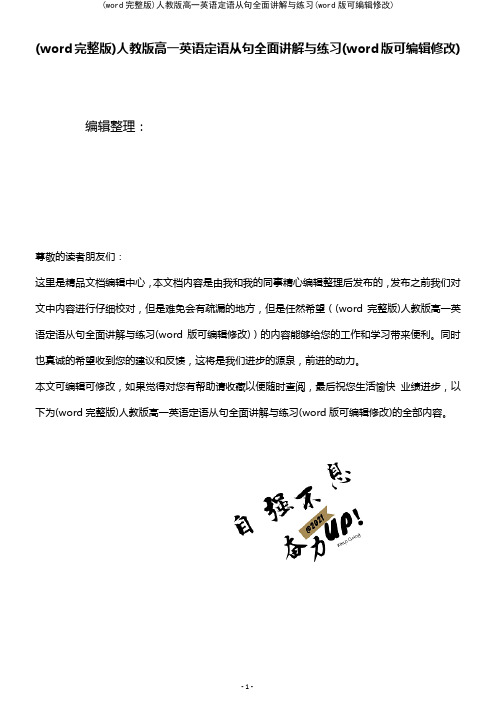
(word完整版)人教版高一英语定语从句全面讲解与练习(word版可编辑修改) 编辑整理:尊敬的读者朋友们:这里是精品文档编辑中心,本文档内容是由我和我的同事精心编辑整理后发布的,发布之前我们对文中内容进行仔细校对,但是难免会有疏漏的地方,但是任然希望((word完整版)人教版高一英语定语从句全面讲解与练习(word版可编辑修改))的内容能够给您的工作和学习带来便利。
同时也真诚的希望收到您的建议和反馈,这将是我们进步的源泉,前进的动力。
本文可编辑可修改,如果觉得对您有帮助请收藏以便随时查阅,最后祝您生活愉快业绩进步,以下为(word完整版)人教版高一英语定语从句全面讲解与练习(word版可编辑修改)的全部内容。
定语从句定语:定语用来限定、修饰名词或代词的,是对名词或代词起修饰、限定作用的词、短语或句子,汉语中常用‘……的’表示.例如 a clever boy the boiling water fallen leaves•The boy in the classroom needs a pen.•The man standing there is my teacher。
定语从句:一个句子充当定语The boy who is reading needs the pen.单词作定语时通常放在它所修饰的词之前,作前置定语.短语和从句作定语时则放在所修饰的词之后,作后置定语。
Ⅰ. 概念:(1) 定语从句:在主从复合句中用作定语的从句叫定语从句。
定语从句一般紧接在先行词后面。
(2) 先行词:被定语从句修饰的成份。
先行词可以为一个词,短语,或整个主句。
(3) 关系词:引导定语从句的词,并代替先行词在从句中担任一定的成分.分为关系代词和关系副词。
(4) 定语从句基本构成:先行词+关系词+从句A) 关系词的作用:1) 引导定语从句,连接主句和从句,相当于一个连词;2) 必在从句中作某个句子成份(可以做主语,宾语,表语,定语,状语)1。
高中英语语法基础 ——定语从句知识点总结归纳讲解(附同步练习)(有答案)
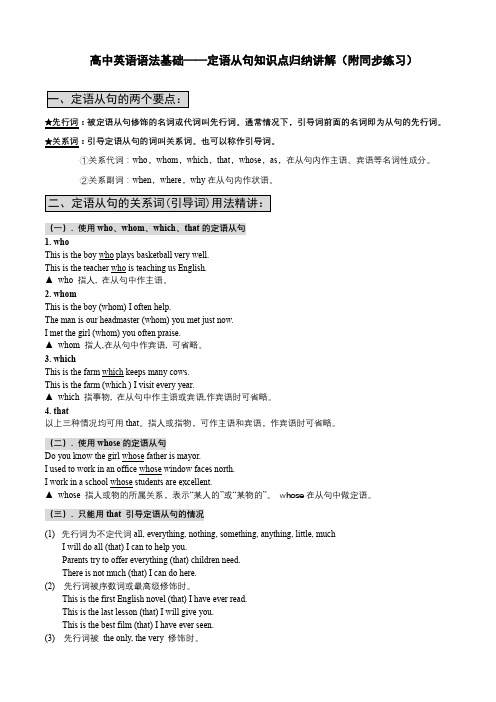
高中英语语法基础——定语从句知识点归纳讲解(附同步练习)★先行词:被定语从句修饰的名词或代词叫先行词。
通常情况下,引导词前面的名词即为从句的先行词。
★关系词:引导定语从句的词叫关系词。
也可以称作引导词。
①关系代词:who,whom,which,that,whose,as,在从句内作主语、宾语等名词性成分。
②关系副词:when,where,why在从句内作状语。
(一). 使用who、whom、which、that的定语从句1. whoThis is the boy who plays basketball very well.This is the teacher who is teaching us English.▲who 指人, 在从句中作主语。
2. whomThis is the boy (whom) I often help.The man is our headmaster (whom) you met just now.I met the girl (whom) you often praise.▲whom 指人,在从句中作宾语, 可省略。
3. whichThis is the farm which keeps many cows.This is the farm (which ) I visit every year.▲which 指事物, 在从句中作主语或宾语,作宾语时可省略。
4. that以上三种情况均可用that。
指人或指物,可作主语和宾语,作宾语时可省略。
(二). 使用whose的定语从句Do you know the girl whose father is mayor.I used to work in an office whose window faces north.I work in a school whose students are excellent.▲whose 指人或物的所属关系,表示“某人的”或“某物的”。
人教版高一英语定语从句完整版 讲解加练习 课件(共37张)

9. The farmers and their happy life_____ D we saw in the countryside made a wonderful impression on us. A. whom B. who C. which D. /
1.Yunnan is the place ____ I grew up. 2.I remember the day ____I first met him. 3.Can you tell me the reason ____ you lied.
1. where 2. when 3. why
关系副词与介词+关系代词的替换
This is the point that they disagree with. This is the point with which they disagree. That is the house that they spent much money on. That is the house on which they spent much money.
定语的位置一般有两种:用在所修饰词之前 的叫前置定语,用在所修饰词之后的叫后置定语。 单词作定语时通常放在它所修饰的词之前, 作前置定语。副词,短语和从句作定语时则放在 所修饰的词之后,作后置定语。
The Attributive Clause 定语从句
Which one is Wang Yuan?
什么可以做定语?
The little boy needs a blue pen. 形容词 There are two boys in the room. 数词 His boy needs Tom's pen. 代词或名词所有格 The boy in the classroom needs a pen. The boy in blue is Tom. 介词短语做定语 It is a pear tree. 名词 The best boy here is Tom. 副词 There is nothing to do today. 不定式 The smiling boy needs a pen bought by his 分词(短语) mother. The boy who is reading needs the pen which you bought yesterday. 定语从句 There are five boys who will play the game.
高中英语定语从句讲解及练习题 含答案

高中英语定语从句讲解及练习题含答案定语从句是指修饰一个名词或代词的从句,用来限制或说明这个名词或代词的性质、状态、特点、数量等。
在英语中,定语从句使用的引导词包括关系代词who, whom, whose, which, that,以及关系副词where, when, why。
关系代词和关系副词的用法关系代词和关系副词的用法如下:关系代词:who, whom, whose, which, that1) who/whom/whose:用于人who:用于主语The man who is standing over there is my father.whom:用于宾语The woman whom I met yesterday is a doctor.whose:用于所有格The girl whose name is Lucy is my friend.2) which/that:用于物which:用于非限定性定语从句My house, which is near the park, is very quiet.that:用于限定性定语从句The book that you lent me is very interesting.注意:that 既可以用于人也可以用于物,但who/whom/whose 不能用于非限定性定语从句。
关系副词:where, when, whywhere:用于地点This is the school where I study.when:用于时间I still remember the day when we first met.why:用于原因This is the reason why I am late.定语从句的位置定语从句通常紧跟在被修饰的名词或代词后面,如果是用关系代词who, whom, whose, which, that 引导的定语从句,则可以省略该代词的主语或宾语成分,并将关系代词作为引导词。
2019年人教版高一英语必修一定语从句详解和练习精品教育.doc

定语从句一、定义及相关术语1、定语从句:修饰某一名词或代词的从句叫定语从句。
定语从句一般跟在它所修饰的先行词之后。
定语从句一般都紧跟在它所修饰名词后面,所以如果在名词或代词后面出现一个从句,根据它与前面名词或代词的逻辑关系来判断是否是定语从句。
2、先行词:被定语从句修饰的词叫先行词。
3、关系词:引导定语从句的词叫关系词。
关系词有关系代词和关系副词;关系代词有that, which, who, whom, whose, as等;关系副词有when, where, why等。
关系词通常有下列三个作用:A、引导定语从句;B、代替先行词;C、在定语从句中担当一个成分4.定语从句分为限制性定语从句和非限制性定语从句:①限制性定语从句对先行词起限制、确定的作用,是先行词不可缺少的定语,如果省去,主句的意思就会不完整或不合逻辑。
这种定语从句和主句之间不能用逗号隔开。
②非限制性定语从句和先行词关系松散,只是对先行词作附加说明,如果省去,主句的意思仍然完整或清楚.从句和主句之间须用逗号隔开。
关系词指代充当成分关系代词that 人或物主(宾)which 物主(宾)who 人主(宾)whom 人宾语whose+n 人或物定语Eg. I know the man who/that wear a hat. (连接主从句,替代先行词the man,在定从中做主语)III. 定语从句解题三步骤:1.找出先行词2.判断成分:确定先行词在从句中的成分(主语,宾语,状语)3.选择正确的关系词注意:准确判断先行词在定语从句中的成分①.请找出下面句子中的定语从句,并判断其成分:(1)I met Mary who looked very sad.(2)The old man whom you talked to yesterday is my uncle.(3)This is the pen which he gave me.二、关系代词引导的定语从句1、who 指人,在定语从句中作主语,宾语,做宾语时常可省略。
- 1、下载文档前请自行甄别文档内容的完整性,平台不提供额外的编辑、内容补充、找答案等附加服务。
- 2、"仅部分预览"的文档,不可在线预览部分如存在完整性等问题,可反馈申请退款(可完整预览的文档不适用该条件!)。
- 3、如文档侵犯您的权益,请联系客服反馈,我们会尽快为您处理(人工客服工作时间:9:00-18:30)。
(完整word版)人教版高一英语定语从句全面讲解与练习亲爱的读者:本文内容由我和我的同事精心收集整理后编辑发布到文库,发布之前我们对文中内容进行详细的校对,但难免会有错误的地方,如果有错误的地方请您评论区留言,我们予以纠正,如果本文档对您有帮助,请您下载收藏以便随时调用。
下面是本文详细内容。
最后最您生活愉快 ~O(∩_∩)O ~定语从句定语:定语用来限定、修饰名词或代词的,是对名词或代词起修饰、限定作用的词、短语或句子,汉语中常用‘……的’表示。
例如 a clever boy the boiling water fallen leaves•The boy in the classroom needs a pen.•The man standing there is my teacher.定语从句:一个句子充当定语The boy who is reading needs the pen.单词作定语时通常放在它所修饰的词之前,作前置定语。
短语和从句作定语时则放在所修饰的词之后,作后置定语。
Ⅰ. 概念:(1) 定语从句:在主从复合句中用作定语的从句叫定语从句。
定语从句一般紧接在先行词后面。
(2) 先行词:被定语从句修饰的成份。
先行词可以为一个词,短语,或整个主句。
(3) 关系词:引导定语从句的词,并代替先行词在从句中担任一定的成分。
分为关系代词和关系副词。
(4) 定语从句基本构成:先行词+关系词+从句A) 关系词的作用:1) 引导定语从句,连接主句和从句,相当于一个连词;2) 必在从句中作某个句子成份(可以做主语,宾语,表语,定语,状语)1.The student who answered the question was John.2. I know the reason why he was so angry.3. The boy (whom) you are talking to is my brother.4. I’d like a room whose window lo oks out over the sea.B)简单句变定语从句例1:The girl is Mary. The girl is standing there.The girl (who is standing there ) is Mary.如何改写定语从句?1、找准主句和从句,并找出两个简单句的共有成分,确定先行词。
2、将从句中的共有成分去掉。
3.找准关系词,用关系词引导从句剩下的部分,并紧接在被修饰词(先行词)之后。
例2:A plane is a machine. The machine can fly.例3:The girl is Mary. We saw her yesterday.C)定语从句选择关系词三步曲:第一找出先行词;第二看先行词在定语从句中的语法功能(做主语、宾语或状语);第三选择合适的关系词。
Ⅱ. 几个关系代词的基本用法:●that: 可指人或物;在定语从句中作主语,宾语,表语。
(指人时,相当于who或whom;指物时,相当于which)(一般不用于非限制性定语从句; 不可置于介词后作宾语) 如:1. A letter that/which is written in pencil is difficult to read. (主语)2. Do you know the gentleman that/who spoke just now?3. You can take anything (that) you like. (宾语)4. What is the question (that/which) they are talking about?5. Here is the man ( who/whom/that ) you want to see.●which: 指物;在定语从句中作主语,宾语如:1. The book which/that was on the desk was bought by my father.(主语)2. The book (which/that) I bought yesterday is very interesting.(宾语)3. He was proud, which his brother never was. (表语)●who, whom, whose:who: 主格, 在从句中作主语,在口语或非正式用法中作宾语; 只可指人whom: 宾格,在从句中作宾语; 只可指人whose: 属格,在从句中作定语,可指人也可指物。
I like the students who/that work hard. (主语)All who heard the story were amazed. (代词如he, they, any, those, all, one等后多用who.)He's a man from whom we should learn. (宾语)= He's a man (whom/who/that) we should learn from.A child whose parents are dead is called an orphan.(指人)I'd like a room whose window faces south. (指物)whose +n. =the +n. + of which (物)= of which (物)+ the +n.=I'd like a room of which the window faces south. whose + n. =the +n. + of whom(人)= ofwhom(人)+ the +n.=I'd like a room the window of which faces south.注意:定语从句中的谓语动词的单复数于先行词保持一致This is one of the best books that have ever been written.He is one of the students who study hard at school.当one前面有the only等限定词和修饰语时, 定语从句的谓语动词要与one保持一致而取单数形式例如This is the only one of the best books that has ever been written.He is the only one of the students who studies hard at school.Ⅲ. 几个易混淆的关系代词的比较:●宜用that, 而不宜用which 的情况.①先行词为不定代词表示物,all, much, something, everything, anything ,nothing, none, the one等,②先行词被only, any, few, little, no, just, very, one of等词修饰时。
③先行词是序数词时或被序数词修饰时。
④先行词是最高级或被最高级修饰时。
.⑤先行词既有人又有物,用which和who都不适合,这时宜用that. 如:⑧主句是There be 结构,修饰其主句的定语从句宜用that 作关系代词. 如:1. There is still a seat in the corner that is still free.⑨被修饰成分为表语时,或者关系代词本身是定语从句的表语时,该关系代词宜用that .2. My home village is no longer the place ( that ) it used to be .●定语从句中宜用which而不宜用that 的情况:①当关系代词的前面有介词时.1.A zoo is a park in which many kinds of animals are kept for exhibition.②在非限制性定语从句中.1.Crusoe's dog, which was are now very old, became ill and died .2.More and more people are beginning to learn English, which is becoming very popular in our country. (which指代主句)(B) who & that:● who 和that 指代人时,有些情况宜用who, 而不宜用that①先行词为anyone, anybody, those, all, one, ones, they, he, people时. 如:.②在There be 结构中,修饰主语的定语从句宜用关系代词who 指代人. 如:1.There is a gentleman who wants to see you .Ⅳ.关系副词引导的定语从句:●When 指时间,在定语从句中作时间状语。
定语从句中when=in/on/at which, 其先行词是表时间的名词(如:time, day, week, tear, month, etc.)I still remember the day when /on which my brother joined the army.(作状语)I shall never forget the day when Shen Zhou Ⅴwas launched, which has a great effect on my life.I still remember the days which/that we spent together. (作宾语)Next winter which/that you'll spend in Harbin, I'm sure, will be exciting.●Where 指地点,在定语从句中作地点状语。
定语从句中where=in/on/at which,其先行词是表示地点的名词,如:place, school, factory, room, etc.This is the factory where /in which he worked last year. (作状语)This is the place where I was born.This is the park which/that they visited last year. (作宾语)I live in the room which was bought by my father.I think you have got to the point where a change is needed, or you would fail.He's got himself into a dangerous situation where he's likely to lose control of the plane.●Why 指原因,在定语从句中作原因状语。
